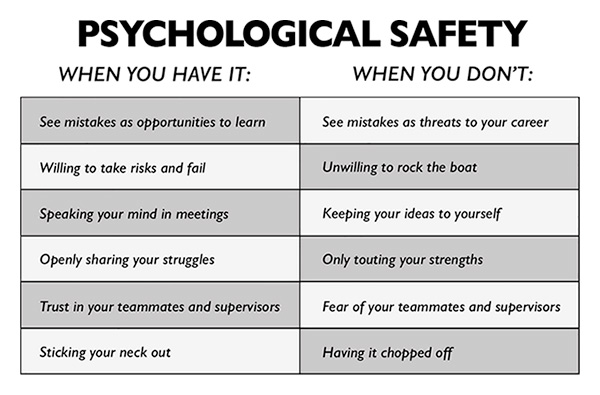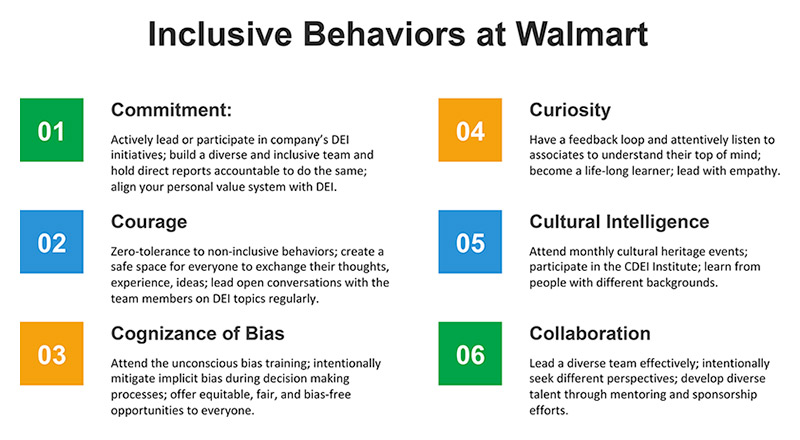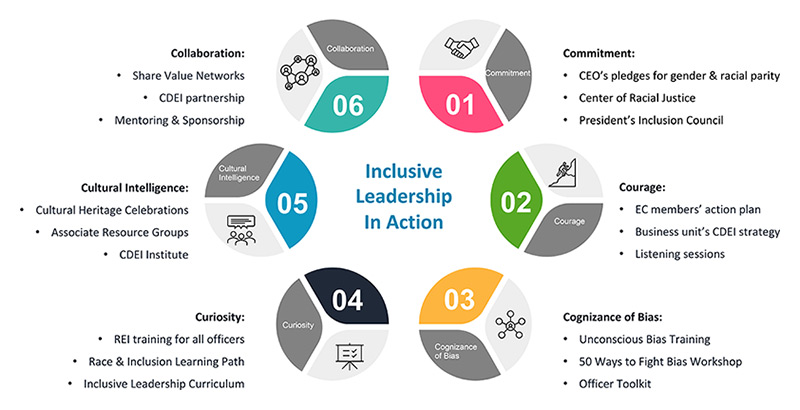By Donald Fan, Senior Director, Global Office of Culture, Diversity, Equity & Inclusion for Walmart
More and more organizations have recognized the significance of advancing equity as a strategic imperative and competitive advantage. In my article, which appeared in the fall issue of this publication and was entitled “Four Essential Levers CEOs Can Adopt to Achieve Racial and Gender Equality,” I discussed how the following four essential factors play an integral role in cultivating an equitable and inclusive culture: leading purposefully; making a cultural change; fostering an ecosystem; and focusing on actions and changes. In order to spark further discussion and exchanges of best practices, I will share some programmatic approaches my employer, Walmart, has taken and what we have learned along this journey.
Leading Purposefully
Business executives set the tone and lead the change through an overarching outlook, explicit expectations, and unwavering grit.
In June 2020, Walmart CEO Doug McMillon announced a five-year, $100 million commitment to establish a Center For Racial Equity. This pledge is part of an ambitious effort to influence and lead change in society by investing resources and developing strategies to increase fairness, equity, and justice in aspects of everyday life. The investments are particularly focused on racial equity in our nation’s criminal justice, education/workforce, financial, and healthcare systems. We will find the areas where our core business can help change systems that perpetuate racism and discrimination. This is in addition to the work we have been doing to build a more inclusive company.
Since June, we have extended and accelerated societal impact through the new Center for Racial Equity. The center’s initiatives fund research, advocacy, innovation of practices and tools, and support the work of Black philanthropic leaders and organizations that serve Black communities. The center also has provided counsel across Walmart to increase understanding and improve efforts that promote equity and address the structural racism that persists in America. Earlier this year, Walmart and the Walmart Foundation distributed the first $14.3 million to 16 nonprofit organizations that advance racial equity in education, health care, and more.
Additionally, four Shared Value Networks (SVNs) were created to help society address the root causes of racial disparities in these systems. SVNs are teams of Walmart associates who come together to help solve societal problems by identifying the natural overlaps between Walmart capabilities (products, services, technology, sourcing, jobs, advancement, etc.) and opportunities to advance racial equity at scale.
Walmart CEO participated in multiple national pledges and committed to achieving racial and gender parity across all levels in the workplace. In an email to our associates, Doug said, “As an associate at Walmart, you are expected to truly, authentically, and more deeply embrace inclusion. We must work together to actively shape the culture to be more inclusive and not just accept our differences but celebrate them—all the time—within every team. We have made a difference in the world in so many ways. We can make a meaningful, lasting difference in racial equity, too.”
Doug chairs the President’s Inclusion Council to improve our talent pipeline and diverse representation in senior leadership by operationalizing practices, principles, and processes related to Walmart’s culture, diversity, equity, and inclusion strategy, including talent lifecycle integration, modernizing measurements, building an inclusive brand, and activating the culture.
The following four guiding principles improve the company’s health in the areas of diversity, equity, inclusion (DEI), and ensure that we maintain our commitment to racial and gender parity:
- Objectivity–Minimize subjectivity to reduce the risk of bias in talent processes.
- Transparency–Increase access to information through communication and collaboration.
- Data-driven decisions–Collect and analyze data and generate verifiable insights to make better decisions.
- Accountability–Promote action through ownership and acceptance of responsibility for inclusive behaviors.
Our CEO leverages the monthly diversity and inclusion report to constantly engage the executive committee members and urge impactful change through continuous discussions and action plans, using data stories to uncover WHAT (issues that stand in the way); employ insight and intelligence to explain WHY (root cause); and commit to HOW (action plans to tackle the problems and sustain the progress). Every corporate officer has access to the Enterprise DEI Dashboard, which provides indepth visibility of the talent composition, mobility, and movement trending for their organization. The data is updated each month, so business leaders can respond in a timely fashion to localized and current challenges. And the PeopleBot mobile app, supported by AI and machine-learning, allows them to reveal DEI stats and insights right away with voice or keyword commends.
Making a Cultural Change
Advancing equity and inclusivity calls for a cultural change. Walmart Chief Global People Officer Donna Morris said, “Ultimately, the role in building a more inclusive culture starts with every associate working at Walmart, and we’re taking steps to make that happen every day. We will win in retail and business through our humanity, and we’ll display our humanity when we do our best to be open, understanding, kind, and accepting of others as their authentic selves.”
We push ourselves harder to create an inclusive and equitable culture at Walmart—for each other, for our customers, and for our communities. Our collective beliefs and behaviors will make a difference.
Our new DEI playbook adopts upstream thinking—exploring and resolving root causes through committed action and targeted change to prevent issues from arising. Like the first principles in physics, pivoting on uncovering the essence of the world rather than assumptions driven by superficial appearance, this approach aims to discover and implement a system- and process-based solution. It starts with cultivating an equitable and inclusive work environment.
Another determining factor of making a cultural change is psychological safety. In his latest book, Think Again: The Power of Knowing What You Don’t Know, Adam Grant indicates that without psychological safety, people hide mistakes and withhold ideas. They aim to prove themselves and protect their image. With psychological safety, people admit errors and voice suggestions. They strive to improve themselves and protect their team.

Walmart proceeds with open and honest conversations, fosters trust-based relationships, nurtures an inclusive environment, and takes action to mitigate racial and gender inequity and injustice. The Associate Resource Groups utilize monthly events and listening sessions as feedback loops to elevate their collective voice and connect with diverse talent.
As part of a multitude of efforts in driving racial justice, Walmart’s CEO recently initiated a video series titled, On the Journey: Conversations with Doug About Racial Equity at Walmart. He hosts candid conversations with Walmart leaders on various racial justice topics and explores opportunities to build a culture of inclusivity and equity in our workplace and beyond the four walls of our company.
Walmart launched the RACE Ahead (Raising Authentic Conversations on Equity) series in June 2020 with a panel conversation that featured senior company leaders discussing Walmart’s response to racial inequity and the disparate impact of COVID-19 on communities of color. Each session seeks to create a safe space for transparent, relevant, and solutions-oriented conversations that are respectful and inclusive of all perspectives.
We believe we are stronger as a company and a society when people are heard, included, and empowered. Not just hoping for that change, we are acting boldly to create that culture change.
Fostering a Supportive Ecosystem
According to a study by McKinsey and LeanIn.Org, white men still hold 66 percent of C-suite positions and 59 percent of senior vice president posts nationally. White women hold the second-largest share of such positions, though they lag significantly behind their male counterparts, filling only 19 percent of C-suite jobs and 23 percent of senior vice president spots. Men of color account for 12 percent and 13 percent of such roles, respectively, while women of color hold only 3 percent and 5 percent. To turn it around and accelerate equity in the workplace calls for a supportive ecology.
At Walmart, our DEI vision is to include everyone. By fostering an interconnected ecosystem, where everyone is—and feels—included, everyone wins. The stakeholders in this support system depend on each other but share a common purpose and collaborate to achieve the overarching objective. Getting everyone engaged is essential for winning the game.
We introduced MARC, Men Advocating Real Change Workshop, a Catalyst initiative to inspire our male executives to leverage their unique opportunity and responsibility to be advocates and change agents for equity. The research-based, experiential learning disrupts traditional DEI approaches to enhance gender partnership and accelerate inclusive workplaces. The participants developed a deeper understanding of the dynamics and implications of inequity, practiced skills to proactively challenge exclusionary dynamics, and committed to building a more inclusive workplace. We keep reminding ourselves if we do not consciously include everyone, we will unconsciously exclude someone.
Walmart invests in associates by supporting them throughout their career journey to unleash their full potential. Our leaders empower store associates to think like entrepreneurs, treating each area of the store as its own small business. That mentality drives autonomy, accountability, and most important, leads to more career opportunities. When our associates know what they own and why, there is nothing they cannot do.
We are encouraged by growth and development specific to our Live Better U (LBU) program. Since its launch in 2018, more than 60 percent of the participants have been women, and 47 percent, associates of color. This program brings a suite of education benefits together to make it easier for our associates to learn about and access options designed to help them unlock their futures. It includes Walmart’s $1 a Day for College Degree Program, tuition-free high school diploma or GED completion, tuition discounts on advanced degrees, free foreign language learning courses, and LinkedIn Learning courses.
Our DEI Toolkit introduced fair, equitable, and bias-free processes, policies, and practices to our talent lifecycle—in recruiting, hiring, talent review, promotion, performance evaluation, and posting open positions internally first in order to drive talent development and mobility. Investing in these critical moments enriches the career experience of our diverse talent, increases their engagement, and elevates their performance.
We hold leaders accountable to make a difference in identifying opportunities to further enhance diversity across all levels in the organization. Each CEO direct report develops his or her customized DEI action plan to sustain the progress. To expand the sphere of influence at scale, we have recently evolved our office’s role to be a strategic partner and advisor to business units—a trusted coach, problem solver, and change agent.
The well-being of our associates continues to be one of our top priorities. Being part of the Walmart team means our associates experience the “live better” promise firsthand. We are focused on three primary forms of well-being—physical, emotional, and financial. By combining world-class benefits with competitive pay, we are focused on supporting our associates and helping them through life’s biggest moments. And as we take care of our associates, they focus on the care of our customers and communities worldwide.
Focusing on Mindset and Behavior Change
Organizations with a growth mindset are more mentally primed to approach and take on challenges, take advantage of feedback, adopt the most effective problem-solving strategies, provide developmental feedback to subordinates, and be persistent in accomplishing goals. Next-generation leaders must develop and demonstrate a growth mindset with an ever-evolving set of characteristics and inclusive leadership skills to achieve business results and personal career growth.
We promote the 6C model of inclusive leadership, originated by Deloitte, by asking the following core questions and encouraging desired behaviors:
- Commitment: Can I articulate Walmart’s commitment to DEI, hold others accountable, and make DEI a personal priority?
- Courage: Do I stand up against non-inclusive behaviors and microaggressions, challenge the status quo, and lead DEI by example?
- Cognizance of Bias: Do I know my blind spots, understand flaws in the system, and work hard to be fair, equitable, and inclusive?
- Curiosity: Do I demonstrate an open mindset, listen without judgment, and seek empathy to understand those around us?
- Cultural Intelligence: Am I attentive to others’ cultures and adapt as required?
- Collaboration: Do I empower others by obtaining diversity of thoughts, providing psychological safety, and concentrating on team cohesion?

To develop Inclusive Leadership and cultivate allyship at Walmart, more than 72,000 of our managers have Inclusive Leadership Expectations each year. They are required to do the following:
- Participate in approved Inclusive Leadership Education offerings
- Actively mentor at least 2 associates, host a mentoring circle, or participate as a mentor in a program such as Lean In Mentoring Circles
- Complete the Unconscious Bias in Hiring module
- Participate in using diverse slates/panels and internal posting standards
A Mentor-Matching tool backed by AI facilitates both mentors and mentees to find the right peer based on individual career interests, developmental needs, and personal profile. Walmart’s inclusive leadership curriculum and content library offers our team leads and managers training sessions and self-learning materials on various topics related to DEI. We recommend that all associates participate in the self-paced Race & Inclusion Learning Paths. And we encourage our male associates to choose from among more than 1,000 Lean In Circles, to have more dynamic conversations and become advocates in advancing gender equity in our work environment.
The pathway for change involves leadership sponsorship, champions as role models and first followers, a sense of purpose, and grit for execution. By applying design thinking, we become intentional in devising programs and initiatives that contribute to mindset and behavior change.

Conclusion
Today, 40 percent of our CEO’s direct reports are women. In our U.S. operations, women make up 55 percent of our workforce, 47 percent of management, and 32 percent of corporate officers. Associates of color make up 47 percent of our total workforce, 37 percent of management, and 27 percent of corporate officers. Walmart was named a Top 32 Company for Diversity by DiversityInc in 2020 and among the Top 11 in Fortune’s World Most Admired Companies 2021.
We know we have more work to do. We will continue to invest in our associates, and help them remove barriers and achieve their career aspirations. We will concentrate on listening, learning, and elevating our associates’ voices, ensuring that we drive changes that will create a Walmart where everyone feels included and valued, and has an equal opportunity for growth, development, rewards, and impact.
Chief Culture, Diversity, Equity & Inclusion Officer Ben Hasan said, “If this year has taught me anything, it’s that none of us knows what tomorrow will bring. What I do know is that if we’re all committed to listening, learning, and leading, there’s hope that tomorrow will be a little more inclusive and equitable than today.” In sharing this common purpose, we all understand our obligation, feel part of the larger story, and are proud of our accomplishments along the journey.
Equity at Work: Donald Fan
This article is one of a three-part series on the topic of Equity at Work. With the heuristic study, the author aims to answer the fundamental question: Why and how does equity create value in corporate America. The first article, “Four Essential Levers CEOs Can Adopt to Achieve Racial & Gender Equality,” was published in the PDJ’s Fall 2020 issue, to discuss the leadership competencies needed to advance equity. The second piece, “Charting the Path to Equity in the Workplace,” in the PDJ’s 2021 Q1 issue, presents a case study demonstrating how business leaders elevate equity at work. In the third article, “How To Make Equity Center Stage All the Time,” the author further explores how to make systemic changes and integrate equity into business DNA.
Equity at Work

Donald Fan
Donald Fan serves as Senior Director in the Global Office of Culture, Diversity, Equity & Inclusion at Walmart Inc.






